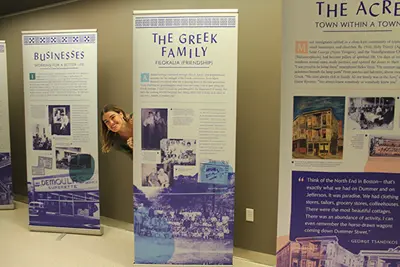Elizabeth Williams Explores Middle Eastern History
 Image by Courtesy
Image by Courtesy
06/11/2020
By Katharine Webster
How does a person become a scholar of change in the Middle East?
Judging by the career path of Asst. Prof. Elizabeth Williams, the History Department’s newest faculty member, it’s a gradual process involving deliberate exploration and education – and the learning of multiple languages.
Williams, who teaches Middle Eastern history, just received an exclusive Kluge Fellowship to spend nearly a year doing research at the Library of Congress, where she will finish her first book, on the transformation of rural life from the late 19th-century Ottoman Empire through the transition to French rule after World War I – and start research on her second, in which she will examine how the Aleppo region was affected by its division between Turkey and Syria in the early 1920s.
“Research is always a process of discovery,” she says. “You go to the archives and see the richness of the material, and that can lead you in unexpected directions.”
Williams has explored archives and libraries in Lebanon, Turkey, Syria, France and England, and she has studied French, Arabic, Modern Turkish, Ottoman Turkish and local Arabic dialects. Her studies have included extended stays in several Middle Eastern countries.
As an undergraduate at William & Mary, she majored in English and religious studies. By the time she graduated, she knew she wanted to be a professor, but she hadn’t decided on a specialty.
She wanted to learn more about the Middle East, though, so she volunteered with the Peace Corps in Jordan after earning her bachelor’s degree. She taught English at a girls’ school in a village, where the people helped her to learn Arabic. Her two years there inspired a commitment to keep studying the region.
Next, Williams pursued a master’s degree at New York University in Near Eastern Studies, an interdisciplinary program that includes classes in anthropology, political science, history and Arabic. While there, she decided to research the area that would become modern-day Syria and Lebanon. She focused on the period of transition from the Ottoman Empire to the French Mandate, which was established by the League of Nations to govern the area after World War I.
While doing research for her thesis on the immediate aftermath of World War I, when a local Arab government ruled the region, between the Ottoman withdrawal and the French occupation of Damascus in 1920, she discovered an intriguing Arabic journal at Harvard University’s Widener Library. Published by a woman in Damascus in 1920, the journal aimed to rally other women and men in support of the fledgling Arab government.
From then on, Williams was hooked on history.
“You go to the archives and you discover people and documents that haven’t been incorporated into the historiography of the period yet, and you get to explore those voices and bring them into the picture. It never gets boring,” she says.
After a year studying advanced Arabic in Damascus, Syria, she began work on a Ph.D. in history at Georgetown University. Through classes on environmental history, she developed an interest in changes in rural life and agrarian policy from one imperial regime to the other as Ottoman, Syrian, Lebanese and French officials experimented with changes to farming methods involving mechanization and the use of chemical fertilizers.
By the time Williams was awarded a Fulbright Fellowship for research abroad on the topic, Syria had become too dangerous for her to return, so she went to Istanbul, former capital of the Ottoman Empire, and did research in the Ottoman archives and other libraries. She followed up with more research in France, Lebanon and England. Her first book, “States of Cultivation,” expands on her dissertation.
The Kluge Fellowship, awarded to only 12 scholars each year by the Library of Congress, will let her delve into the archives of Arabic newspapers for her next book: on how Aleppo’s environment and its economic and social networks were affected when the French rulers of Syria and the Turkish government set new national borders that divided the region after World War I.
Such questions are relevant now, she says.
“Understanding the history of the region’s interconnectedness helps us to better comprehend the underlying political, economic and environmental concerns that drive ongoing conflicts in the area today,” she says.
Williams will start her fellowship next February and remain at the Kluge Center through the end of 2021.
She can’t wait to delve into the library’s Arabic newspaper archives and rare books – and bring back new insights to share with her students, especially in two courses she developed after arriving on campus three years ago: Environmental History of the Middle East and North Africa, and Empire and Resistance in the Modern Middle East.
“You never lack for new things to discover, new stories to explore. That’s what I find so exciting about history,” Williams says.




